SESSION TWO : Report of Allama Muhammad Iqbal Conference
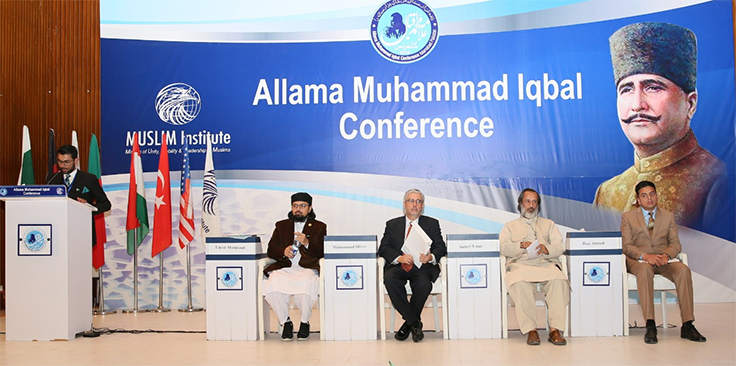 |
|
MUSLIM Institute organized “Allama Muhammad Iqbal Conference” on Thursday, November 8, 2018 at National Library, Islamabad. The Conference was divided in 4 sessions and a Cultural Musical Evening on Kalam-e-Iqbal. Second session “Iqbal in Education and Academia”, was chaired by Prof Dr Suheyl Umar (Former Director, Iqbal Academy of Pakistan, Lahore). His Excellency Mr João Sabido Costa (Ambassador of Portugal to Pakistan) was the guest of honour on the occasion. Dr Umair Mahmood Siddiqui and Mr Riaz Ahmed spoke on the occasion. Mr Asif Tanveer Awan Advocate (Research Associate, MUSLIM Institute) moderated the proceedings of second session. Researchers, scholars, students, university professors, lawyers, journalists, social activists and people from different walks of life participated in the conference.
|
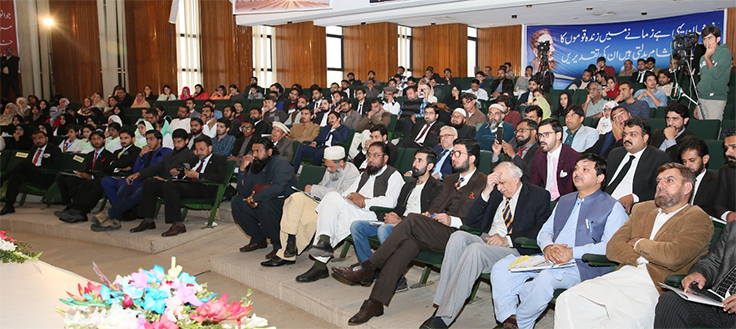
Participant view during the secong session of conference.
|
|
Brief Summary of the remarks shared by speakers in second session are observed as under:
|
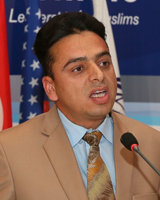 |
Need for Incorporation of Iqbal in Curriculum
Mr Riaz Ahmed
Assistant Professor, Lawrence College, Murree
|
|
Allama Iqbal has argued at various places in his writings from 1902 to 1930 regarding the importance of philosophy, religion and sociology in our current education system. Iqbal’s essay was published in “Rasala Makhzan” in 1902 describing tools and techniques for the upbringing of children and it was the beginning of Iqbal’s educational view point. In this essay, Iqbal laid it compulsory for teachers to study the principles necessary for the upbringing of children. Similarly, describing national life and the unity of Muslim Ummah, Iqbal considered education the basis of religious beliefs and values at one hand and the accomplishment of social needs on the other. Iqbal made it very clear that acquiring education is not merely the study of a few books. But the aim of education is the creation of a perfect man. There were two prevailing education systems in the subcontinent as soon as Iqbal assigned himself to this task. Modern education system and the centres of Islamic knowledge. Iqbal was convinced that both the education systems are unable to bring constructive and intellectual stability among Muslims. A country’s education system should be in accordance with the social needs, ideology and beliefs of that nation. But the prevailing education system in the subcontinent during the British Colonial Era was meant to create Indians with respect to their caste and colour but the Englishmen with respect to their ideology. In Iqbal’s view point, the meaning and purpose of education is to produce men of letters who are enlightened in themselves and are capable of leading the world.
|
|
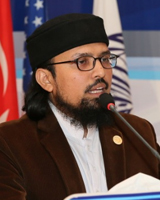 |
Teachings of Iqbal for Bridging the Religious Seminaries and Modern Education System
Dr Umair Mahmood Siddiqui
Assistant Professor, Department of Islamic Learning, University of Karachi
|
|
Our educational system is under threat and greatly influence by foreign parts which subvert our generation’s ideologically. This is the age of doubt, deception, disinformation and ideological subversion. Allama Muhammad Iqbal was the only man in the subcontinent who was fully aware of the crisis of his age and beyond. At that age of colonization, Allama Muhammad Iqbal was gifted to us as a thinker, philosopher, visionary and ideologue who was the leader of the caravan of Ummah of the Holy Prophet (S.A.W). Iqbal's educational policy is based on the true meaning of Quran and basic elements of his educational policy are Taleem (Education), Tarbiyyat (Training), Tadeed (Civility) and Tazkiyya (Spiritual purification). These are the four basic elements of educational policy of Iqbal which is completed with the physical, mental and spiritual development of individuals.
Iqbal laid positive criticism on religious schools, on their syllabus, methods of teaching and aims and objectives. Allama Muhammed Iqbal invited the Muslim world towards the dynamic orthodoxy. His encouragement to have ultimate knowledge of Islamic theology, philosophy, history and deep expertise in Arabic literature is highly commendable.
|
|
|
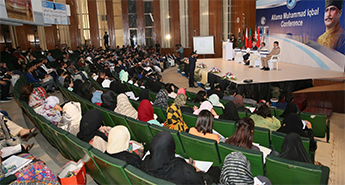
Stage and Participants view during the second session of conference.
|
|
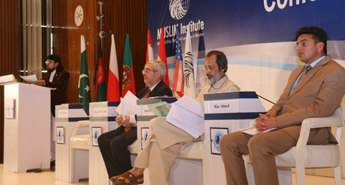
Stage view during the second session of conference.
|
|
|
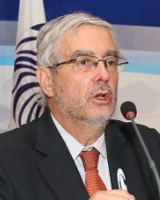 |
Guest of Honour
HE Mr João Sabido Costa
Ambassador of Portugal to Pakistan
|
|
There are several reasons to praise Iqbal and this praise is not limited to the relevance of his literary work in several important languages and his civic and patriotic commitments related to his politics and the subcontinent. Iqbal’s philosophical work linked world culture and civilizations as well as helped the humanity to recall the importance of Islam. Iqbal is also credited for his permanent contributions to understand the true values of global society. Analysing Islamic texts in the light of present scenario, Iqbal’s approach is a social message as a process of continued revelation by God. According to Iqbal, reality of God is revealed to the world in a portrayed and renewed way. Mankind always has the challenge to live by new realities. Following the reality of God, religion proves itself as an everlasting and inexhaustible renovation within orthodox spirits. Renovation does deny tradition and orthodoxy as orthodoxy can stop innovation. Innovation here doesn’t only mean the dynamic of a message addressed to the Muslim people to live accordingly with the eternal process of universe. The revelation received from the God to the Prophet (PBUH) hints at truly being universal in any mean for the unity of humankind. Nowadays, we need bridges of understanding, not the ridges of differences. We cannot risk turning our backs to each other sowing seeds of possible discord and hate. This was the message of great Iqbal. If humankind is heading towards the perfection, that will only be possible if it is a common task linking the goodwill and thirst for knowledge.
|
|
Interactive Session
|
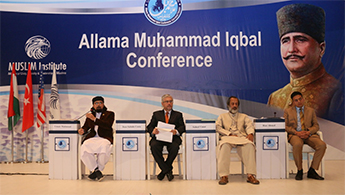
Stage view during the interactive session of conference.
|
|
Brief summary of the various answers by the panellists is as under:
Central objective behind Iqbal’s work is pragmatism and innovation. He laid great emphasis over the education of characters. We have been unsuccessful in inculcating the vision of Iqbal in our youth as well as the practical application of that vision in our institutions up till now. We have to train our youth accordingly and raise them to such a level where they feel a positive moral change which is dreamt by a civilized person. Iqbal gives us the lesson of truth, continuous struggle and the realization of self-actualization. By all this he meant the followership of Mard-e-Kamil (perfect human) in accordance with the injunctions of the Holy Quran. If you have inherited any idea from the West which does not contradict the principles of Islam in our modern education system, then according to Iqbal you are not on the wrong track. Iqbal insisted the presentation of Muslim philosophy in a creative manner in the comity of emerging social sciences without compromising Islamic principles.
Iqbal made it very clear that why he wanted to promote the vitality of Ijma, Qiyas and Ijtihad just because to keep pace with the emerging challenges and in order to avoid the dominancy of foreign thoughts. For the very purpose, we have to purify our modern education system.
Today, our modern education system faces two major challenges which is the promotion of atheism and homosexuality. The very reason behind these challenges is the increasing absence of divine knowledge in our education system. Iqbal narrates that without truth, knowledge is misleading. This misleading knowledge has led many nations violent towards other nations. Iqbal advises us to convert this knowledge into peace by virtue of truth and grant real light to this materialistic world.
|
|
|
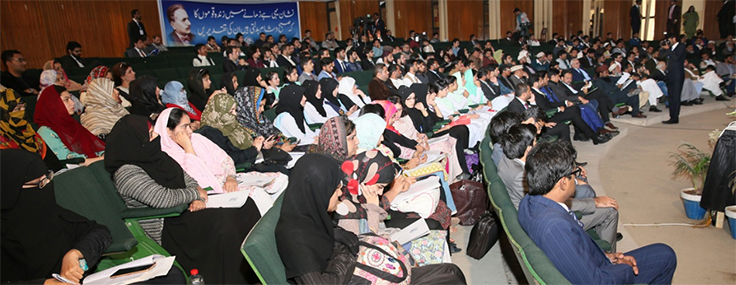
Participant view during the second session of conference.
|
| |
Download pdf
Newsletter
Share
Releated Publications









